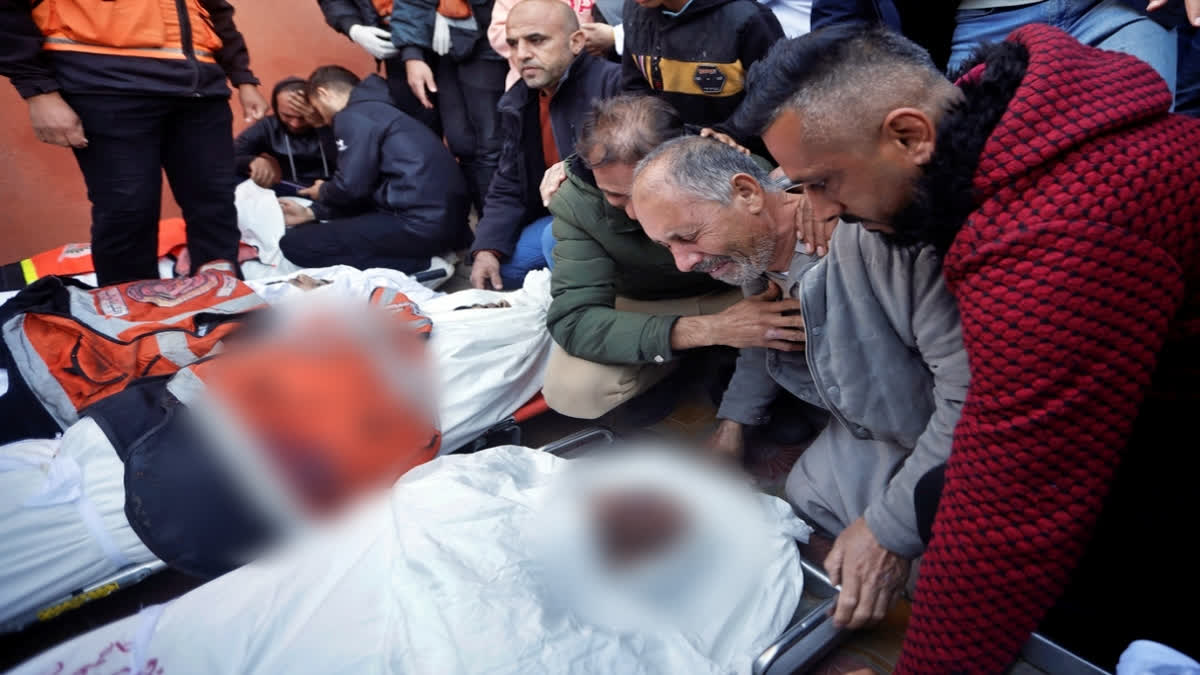Deir Al-Balah (Gaza Strip):Israel's government faced calls for a ceasefire from some of its closest European allies and from protesters at home on Sunday after a series of shootings, including of three hostages who waved a white flag, added to mounting concerns about its conduct in the 10-week-old war in Gaza.
The protesters urge the government to renew hostage negotiations with Gaza's Hamas rulers, whom it has vowed to destroy. Israel could also face pressure to scale back major combat operations when U.S. Defense Secretary Lloyd Austin visits this week, as Washington has expressed growing unease with civilian casualties even while providing vital military and diplomatic support.
The air and ground war has flattened large parts of northern Gaza, killed thousands of civilians and driven most of the population to the southern part of the besieged territory, where many are packed into crowded shelters and tent camps. Some 1.9 million Palestinians — nearly 85% of Gaza’s population — have fled their homes.
They are surviving off a trickle of humanitarian aid. Israel said that starting Sunday, U.N. aid trucks would be able to enter Gaza from a second location, Kerem Shalom. In a sign of desperation, dozens of Palestinians surrounded aid trucks after they drove in through the Rafah crossing with Egypt, forcing some to stop before climbing aboard, pulling boxes down and carrying them off. Other trucks appeared to be guarded by masked people carrying sticks.
Prime Minister Benjamin Netanyahu said Israel “will continue to fight until the end,” with the goal of eliminating Hamas, which triggered the war with its Oct. 7 attack into southern Israel. Palestinian militants killed some 1,200 people that day, mostly civilians, and captured scores of hostages.
Netanyahu vowed to bring back the estimated 129 hostages still in captivity. Anger over the mistaken killing of hostages is likely to increase pressure on him to renew Qatar-mediated negotiations with Hamas over swapping more of the remaining captives for Palestinians imprisoned in Israel. Israeli media reported that David Barnea, the head of Israel's Mossad spy agency, met over the weekend with Qatar's prime minister, Sheikh Mohammed bin Abdulrahman Al Thani, who has mediated with Hamas, to discuss renewed talks.
Gaza meanwhile remained under a communications blackout for a fourth straight day, the longest of several outages during the war. Aid groups say they complicate rescue efforts and make it even more difficult to monitor the toll on civilians.
Calls for a new ceasefire
In Israel on Sunday, French Foreign Minister Catherine Colonna called for an “immediate truce” aimed at releasing more hostages, getting larger amounts of aid into Gaza and moving toward “the beginning of a political solution.” France’s Foreign Ministry earlier said one of its employees was killed in an Israeli strike on a home in Rafah on Wednesday. It condemned the strike, which it said had killed several civilians, and demanded clarification from Israeli authorities.
The foreign ministers of the U.K. and Germany, meanwhile, called for a “sustainable” cease-fire, saying “too many civilians have been killed.” “Israel will not win this war if its operations destroy the prospect of peaceful co-existence with Palestinians,” British Foreign Secretary David Cameron and German Foreign Minister Annalena Baerbock wrote in the U.K.’s Sunday Times.
The U.S. defense secretary is set to travel to Israel to continue discussions on a timetable for ending the war’s most intense phase. Israeli and U.S. officials have spoken of a transition to more targeted strikes aimed at killing Hamas leaders and rescuing hostages, without saying when it would occur.
